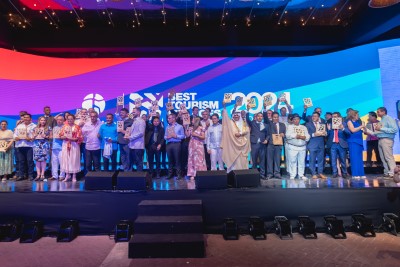Trip.com 2024 Report: Traveller Trends and Expectations in Sustainable Tourism
The Trip.com Group Sustainable Travel Consumer Report 2024 highlights the changing consumer expectations of sustainable tourism and offers a clear insight into the challenges and opportunities this growing sector presents to the travel industry. The report is the result of a survey of 9,867 people in 109 countries.
A Change in Global Mindset

Crédit: Trip.com
The report reveals that an overwhelming majority of travellers worldwide (92%) recognise the importance of sustainable tourism, a trend that has been growing rapidly since the pandemic. For travellers, access to information about sustainable travel options is now seen as a consumer right, rather than just an added benefit. This marks a fundamental change in the way travellers perceive the environmental and social impact of their holiday choices.
However, a gap remains between awareness and concrete action. Some 56.9% of travellers say they have actually opted for sustainable travel, while 48% say they do not fully understand what this entails. This lack of clarity underlines the importance of education and information to help consumers make informed choices.
The different regional priorities
The report shows that motivations for sustainable tourism vary by region. Consumers in Asia-Pacific (APAC) and Latin America (LATAM) are primarily motivated by environmental protection, with 47.2% of respondents in these regions placing the environment at the top of their priorities. In contrast, travellers from Europe, the Middle East and Africa (EMEA) and North America (NORAM) are more likely to consider factors such as wildlife protection, economic impact and cultural preservation in their travel decisions.
The Impact of Prices on Sustainable Tourism
Another major challenge for the sector is price. The report shows that 38.8% of travellers are not prepared to pay more for sustainable options, while 42.5% are open to the idea, but only up to a certain limit. This highlights the need for companies to offer affordable and accessible sustainable options.
Regional analysis reveals that consumers in Asia-Pacific are the most willing to pay a premium for more sustainable travel, while those in North America and Europe, the Middle East and Africa are the most reluctant. This reflects not only increased price sensitivity in these regions, but also scepticism about the authenticity of products labelled ‘sustainable’.
Perception of Sustainable Tourism Across the Generations
The report shows that different generations have different perceptions of sustainable tourism. Generation Z (between 1997 and 2012) is very interested in more responsible travel, with almost 9 out of 10 young people prepared to travel sustainably. However, only 53.6% of them say that the environment is their main motivation, and 48.4% don’t really know what sustainable travel is.
Millennials (born between 1981 and 1996) share this interest, but Baby Boomers and Generation X (1965 to 1980) show less enthusiasm for sustainable options. This shows the importance of better informing young people about what sustainable tourism entails and adapting offers to meet their environmental expectations.
The commitment of online travel agencies
The report also highlights the crucial role that online travel agencies can play in promoting sustainable tourism. 75.8% of respondents believe that they should clearly indicate sustainable options. In addition, 54.8% of travellers would like to receive advice on sustainable travel, and 42% would like to see travel products with sustainability certifications.
The Trip.com Group Sustainable Travel Consumer Report 2024 shows that sustainable tourism is now a priority for travellers, but that more needs to be done to make these options clearer, affordable and accessible. Companies in the sector have a central role to play in educating consumers, simplifying the search for sustainable products and providing credible certification.
By continuing to work together, industry players can help make tourism a positive force for the environment, local economies and communities worldwide. Travellers now want their holidays to have a positive impact, and it’s up to businesses to respond to this growing demand for a more sustainable future.
RECENT POSTS

122nd UN Tourism Executive Council: Innovation, Investment and Education at the Heart of Discussions
LATAM NEWS 122nd UN Tourism Executive Council: Innovation, Investment and Education at the Heart of Discussions The 122nd edition of the UN Tourism Executive Council was held in Cartagena de Indias, Colombia, with the aim of ensuring a more inclusive, resilient and...

“From the Great Wall to Machu Picchu”: A Documentary to Strengthen Tourism Links between China and Peru
LATAM NEWS “From the Great Wall to Machu Picchu": A Documentary to Strengthen Tourism Links between China and Peru To strengthen cultural exchanges and attract Chinese travellers to Peru, PROMPERÚ has collaborated on an ambitious audiovisual project: the documentary...

Best Tourism Villages 2024: an award for excellence in rural tourism
LATAM NEWS Best Tourism Villages 2024: an award for excellence in rural tourismEvery year, UN Tourism celebrates rural destinations that embody sustainable and inclusive tourism through its Best Tourism Villages initiative. The 2024 edition once again highlighted...


